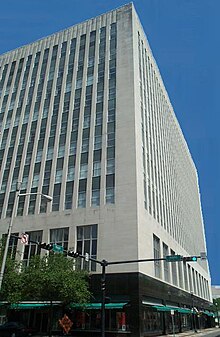Florida National Bank

Edward Ball Building, formerly the Florida National Bank Building
|
|
| Banking | |
| Fate | Acquired by First Union |
| Predecessor | Mercantile Exchange Bank |
| Successor | First Union Corporation |
| Founded | 1905 |
| Founder | Samuel Hubbard |
| Defunct | 1990 |
| Headquarters | Jacksonville, Florida |
Florida National Bank (FNB), founded in 1905, was the second largest commercial bank in Florida. Florida National Group was acquired in 1990 by First Union Corporation, which was renamed Wachovia in 2001.
Samuel Hubbard's Mercantile Exchange Bank eventually became Florida National Bank after Jacksonville's Great Fire of 1901. Millionaire Alfred I. du Pont acquired a major interest in the FNB shortly after moving to Jacksonville in the mid-1920s, but he was unable to gain control until the Great Depression struck in 1929. The FNB stayed solvent throughout the 1930s because du Pont put $15 million of his own money into the institution to cover Bank runs. During the early 1930s, six other Florida National Banks were opened throughout Florida, including Lakeland and Bartow; Alfred's wife, Jessie Ball du Pont was named a director of the bank. When Alfred du Pont died in 1935, the du Pont Trust, managed by Ed Ball, Jessie du Pont's brother, continued to control the bank. Growth continued with the acquisition of many more Florida banks over the next two decades and became known as the Florida National Group, which was one of the strongest banks in the state. In size, the branches eventually numbered 185, second only in Florida to Barnett Bank.
Ball built the Florida National Bank building at 214 North Hogan Street in Jacksonville in 1961. The structure was constructed using materials which would appreciate in value, such as marble floors and granite exteriors, but excluded items that Ball considered frills. There were no executive washrooms and no hot water faucets in the entire eleven story edifice. The corporate offices of the group were housed in the upper floors and the bank's principal location was on the ground floor. Ed Ball also kept his personal office there for managing the du Pont Trust. After Ball's death, the structure was renamed the Edward Ball Building.
Congress forced the du Pont Trust to divest itself of banking interests when they withdrew the trust's 15-year exemption from the Bank Holding Company Act of 1956. The trust sold 34.7% ownership in Florida National Banks to Charter Company in 1971 for $42M, leaving the du Pont Trust with 24.9%, below the legal definition of a bank holding company. The CEO of Charter was Raymond Mason, a protégé of Ed Ball. Additionally, Ed Ball personally owned 6.4% of FNB and was executor of his sister's estate, which owned 4.5% of FNB.
...
Wikipedia
